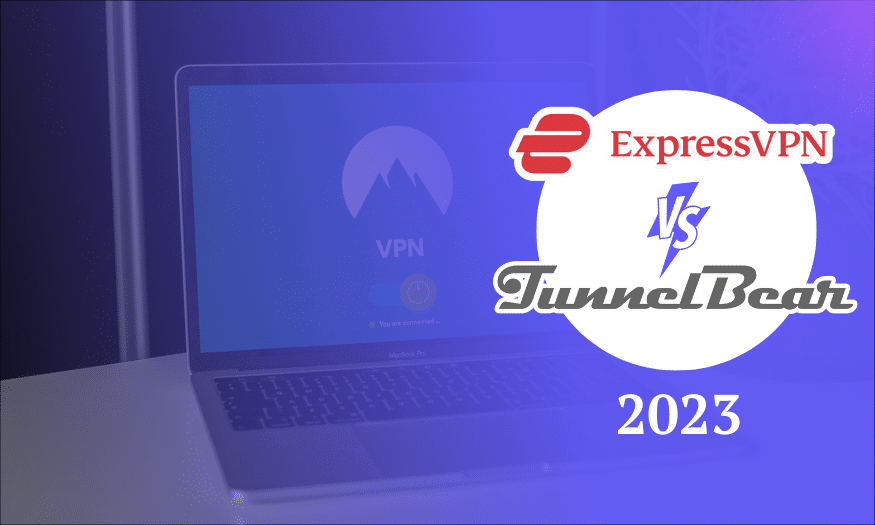
ExpressVPN vs TunnelBear
Quick Answer: ExpressVPN vs TunnelBear
TunnelBear is cheap and user-friendly, but ExpressVPN beats it with more features, faster speeds, better streaming capabilities, and apps for many more platforms (including routers). You can try ExpressVPN using its 30-day money-back guarantee.
The choice between ExpressVPN and TunnelBear is likely to come down to money. Both virtual private networks (VPNs) have clean security records and forgiving app design, but ExpressVPN costs more and has no free plan. However, when I tested these VPNs for this ExpressVPN vs TunnelBear matchup, I found that there’s more to the story.
As my ExpressVPN review argues, ExpressVPN is worth the money. You get more server locations, better streaming ability and router installation to stretch your subscription further. TunnelBear is perfectly fine if you’re on a budget, but it’s much worse at getting into streaming libraries, and its middling speeds make it best for less-complex tasks. My TunnelBear review tells the whole tale.
TunnelBear vs ExpressVPN: Comparison at a Glance
If you’ve narrowed your search for a VPN service down to TunnelBear and ExpressVPN, I’m here to help you make the final call by highlighting how each stacks up in key areas.
I tested both services extensively on all the platforms they support. Both are secure VPNs and great choices for beginners, but their features, pricing, performance and server networks differ significantly.
| Feature: | ExpressVPN | TunnelBear |
|---|---|---|
| Security ➡️ | ✔️ Lightway, OpenVPN & IKEv2 ✔️ Kill switch ✔️ RAM-only servers ✔️ Based in British Virgin Islands | ✔️ OpenVPN, IKEv2 & WireGuard ✔️ Kill switch ✔️ Based in Canada |
| Features ➡️ | ✔️ Split tunneling (app only) ✔️ Obfuscation ✔️ Tracker blocker ✔️ Ad & malware blocker ✔️ Password manager | ✔️Split tunneling (app & site) ✔️Obfuscation ✔️Tracker blocker |
| Speed ➡️ | ⏬ 16% download speed loss (worldwide average) | ⏬ 32% download speed loss (worldwide average) |
| Streaming ➡️ | ✔️ Netflix ✔️ Hulu ✔️ Amazon Prime Video ✔️ BBC iPlayer ✔️ Max ✔️ Disney+ ✔️ Others | ✔️ Max ✔️ Peacock |
| Pricing ➡️ | 💲 Best plan: 15 months for $6.67 per month, eight simultaneous connections | 💲 Best plan: 36 months for $3.33 per month, unlimited simultaneous connections |
| Servers ➡️ | 🌎 105 countries | 🌎 47 countries |
| Platforms ➡️ | ✔️ Windows, macOS & Linux ✔️ Android & iOS ✔️ Chrome, Firefox, Edge & Brave ✔️ Routers ✔️ Smart TVs | ✔️ Windows & macOS ✔️ Android & iOS ✔️ Chrome, Firefox & Edge |
| Parent company ➡️ | Kape Technologies | McAfee |
Which Is Better: ExpressVPN vs TunnelBear?
For almost everyone, ExpressVPN is the better choice — in fact, it gets my vote for best VPN overall.
For security, ExpressVPN has the open-source Lightway protocol, which offers a fast, stable connection with independently vetted encryption. TunnelBear is also pretty secure and recently enabled WireGuard on all its apps, but it lacks RAM-only servers that guarantee that it can’t hand over information about its users.
ExpressVPN is consistently good at unblocking streaming sites, and its broader server network gives users more libraries to choose from. TunnelBear can’t match that performance. Netflix, Hulu, Amazon Prime Video and other services repeatedly blocked it in my tests. It’s also a lot slower on average, so 4K videos aren’t likely to play well.
Therefore, whether you want the best Netflix VPN or you’re just looking to hide your IP address, ExpressVPN does the job better. However, TunnelBear isn’t a bad VPN service. You might even want to choose it over ExpressVPN in certain situations — for example, if you have concerns about ExpressVPN’s parent company, Kape Technologies.
I Recommend ExpressVPN For…
- ✔️ Security: ExpressVPN’s Lightway protocol is fast enough that you can use public WiFi safely without experiencing any slowdowns.
- ✔️ Streaming: ExpressVPN unblocked every streaming service I tested and kept video quality high over long distances.
- ✔️ Torrenting: All of ExpressVPN’s servers work well for torrenting.
Try ExpressVPN with its 30-day money-back guarantee on all plans.
I Recommend TunnelBear For…
- ✔️ Split tunneling: Both VPNs offer split tunneling, but TunnelBear makes it available on all its desktop and mobile apps.
- ✔️ Users on a budget: TunnelBear offers a free VPN plan, and its paid plans cost less than ExpressVPN’s.
- ✔️ Users uncertain about Kape Technologies: Those who don’t trust ExpressVPN’s parent company not to meddle in their business might find TunnelBear a safer bet.
Try TunnelBear on its free plan or affordable paid plan.
Security
ExpressVPN and TunnelBear are most similar in terms of security. They draw from the same cryptographies — AES-256 and ChaCha20, both of which are considered uncrackable with today’s technology. In practice, they’ve also both been secure since launching, without even the peripheral breaches described in my VyprVPN review.
I also tested both services for DNS leaks and other common security hiccups. No server from either VPN provider leaked my IP address. Both are equipped with a VPN kill switch as a failsafe in case your VPN connection drops offline — the kill switch cuts off your internet access as soon as the VPN drops, so you never broadcast any compromising information.
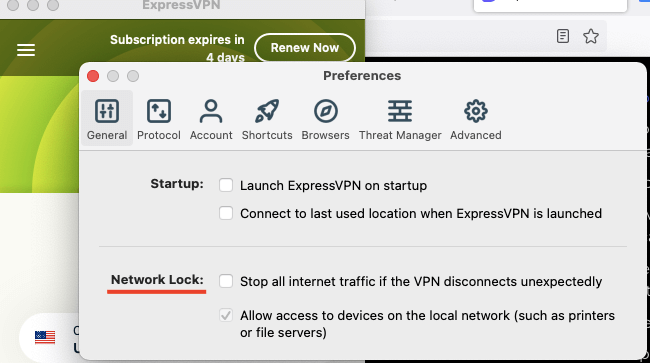
Many ISPs throttle your speeds if they catch you using a torrent client.
With all that said, ExpressVPN has also done more work to protect users from the company itself. Both VPN providers have audited, loophole-free privacy policies, but ExpressVPN uses RAM-only servers, which erase all traces of activity with every hourly reset. If forced by law to hand its servers over to any government, ExpressVPN could truthfully say there was no information to surrender.
TunnelBear may also have made its server network RAM-only, but I couldn’t find any evidence of this. I prefer to be extra cautious with VPN privacy, so I won’t rule out the possibility that TunnelBear could hand over user information if ordered to comply with local law enforcement.
Features
Both ExpressVPN and TunnelBear prioritize user experience over features, so neither one offers an incredible amount of control — if you want fine-grained power over your VPN, CyberGhost is the way to go, as I explain in my CyberGhost review. However, ExpressVPN manages to pack more features into its apps without sacrificing clarity.
You’ll find a few of the same features in both. I’ve already discussed the kill switch. Both VPNs block IPv6 traffic to minimize leaks and offer split tunneling.
Split Tunneling
This feature lets you run some apps or websites through the VPN while leaving others out. Split tunneling is useful for any sites with blocks that your VPN can’t get around.
Split tunneling is one of the few areas where TunnelBear pulls ahead of ExpressVPN. ExpressVPN’s split tunneling isn’t available on iOS or on desktop computers running macOS 11 or above. It also only lets you split traffic by app, not by website.
TunnelBear’s SplitBear split tunneling works on every platform, though whether you can split by app or website depends on your operating system.
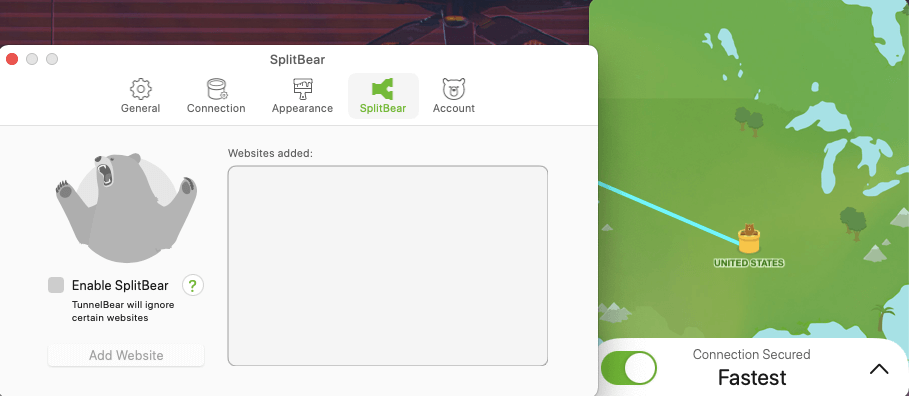
iOS apps only split by website, and the Android client only splits by app.
Obfuscation
Both TunnelBear and ExpressVPN also offer obfuscation, which scrambles the metadata on your VPN traffic to disguise it as normal traffic. You can use this trick to get around firewalls, from blockers at a school or business to country-wide restrictions. That’s why obfuscation is a key trait of the best China VPNs.
ExpressVPN handles obfuscation by building it into all of its servers. When it detects restrictions on a network, it automatically switches on obfuscation — like the NoBorders mode you can read about in my Surfshark review, except the server doesn’t need to change. I’ve seen this happen while using the ExpressVPN app, and the switch takes place without so much as a stutter.
TunnelBear lets users manually enable the GhostBear protocol, so you can decide for yourself when you need obfuscation. The downside is that GhostBear slows down your browsing speed significantly more than ExpressVPN’s obfuscated servers do. In addition, I wasn’t able to find it on the macOS 11 version, and the customer service center offered little help.
Other ExpressVPN Features
That’s about it for TunnelBear’s features, but ExpressVPN has a few more worth noting. It comes with a tracker and malware blocker called Threat Manager, plus a separate ad blocker and parental controls.
These features worked well in my tests, alerting me about unsafe sites and blocking banner and video ads. TunnelBear also has a tracker blocker, called Blocker, but it’s only available on Chrome.
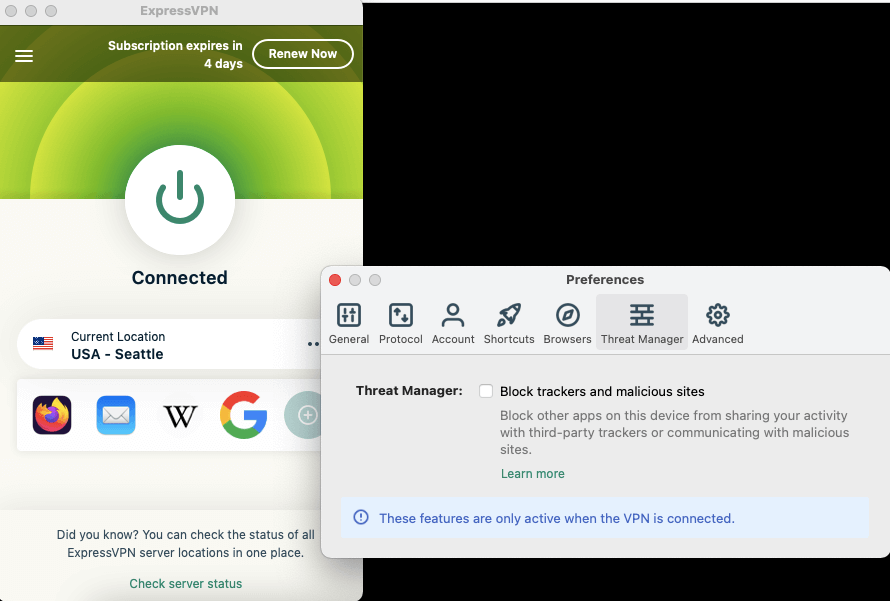
The ExpressVPN macOS app includes a built-in speed test that shows you the relative speeds of all the servers you can choose from. Then there’s ExpressVPN Keys, a password manager (free for all subscribers) that generates and stores strong passwords for your online accounts. See my article on password security to learn more about how password managers work.
Simply listing the features doesn’t fully explain how ExpressVPN gives you more than TunnelBear. ExpressVPN provides several options at every turn, whereas TunnelBear generally limits you to one way of using it. ExpressVPN isn’t the most feature-rich VPN — Surfshark and NordVPN are both more innovative — but it’s more robust than TunnelBear.
Speed
I ran a new batch of speed tests for each service on both Windows and macOS and got some unexpected results. On Windows, ExpressVPN and TunnelBear performed about the same. In fact, TunnelBear was more consistent, whereas ExpressVPN’s speed dropped sharply on some continents.
The macOS tests told a completely different story. TunnelBear fell behind, while ExpressVPN surged ahead. On average, ExpressVPN maintained 92% of my unprotected download speeds worldwide, which is about as close to a perfect performance as possible.
TunnelBear didn’t do as well. On a server near my U.S. testing location, where I expected the best results, my download speeds dropped to about 71% with TunnelBear. The average on all worldwide servers was about 56%, a much spottier performance than ExpressVPN.
| ↕️ | ExpressVPN | TunnelBear |
|---|---|---|
| Average percentage of unprotected download speed (macOS) | 92% | 56% |
| Average percentage of unprotected download speed (Windows) | 75% | 79% |
Latency
I test VPN speeds in multiple areas. Latency — the length of time it takes the VPN server to respond to a single instruction — is important for gaming and other real-time activities. ExpressVPN keeps latencies low. On the nearest server, I only saw an increase of 10 milliseconds (10 ms). The average ping of an ExpressVPN server was 227.8 ms.
TunnelBear increased my latency from 24 ms to 62 ms in the United States and kept climbing. After testing on five continents, I calculated the average latency of the whole system to be 316.4 ms. The data doesn’t lie: ExpressVPN is the better choice for online tasks where reaction time matters.
Streaming
Since a lot of people use VPNs to unblock streaming websites in other countries, my next question was how well each VPN worked as a streaming aid.
TunnelBear is immediately at a disadvantage because of its poor international speeds, which make it a lot harder to get high video quality in other countries, but that’s not the only reason I prefer ExpressVPN for streaming.
If you’ve ever gotten Netflix’s error code m7111-5059, you’ll know that streaming websites like Netflix block VPNs so they can’t be used to violate copyright law. A good streaming VPN has to maintain IP addresses that don’t get caught in the filters. A streaming VPN should be able to change your Netflix region no matter which server you choose.
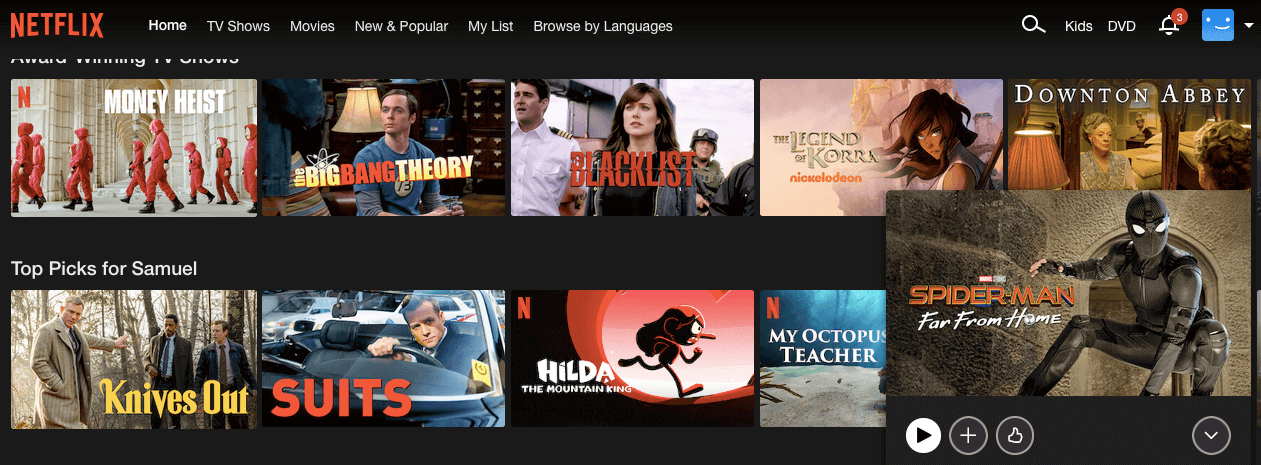
other countries, whereas a bad one just runs into errors.
ExpressVPN isn’t just better than TunnelBear for streaming — it’s the best of any VPN. I tested multiple servers and protocols with six different streaming platforms, and ExpressVPN unblocked all of them every time. In addition to Netflix, it’s the best VPN for Hulu and many other sites as well.
MediaStreamer
Another feature that makes ExpressVPN attractive for streaming is ExpressVPN MediaStreamer, which lets apps without native VPN support change their IP addresses to stream international content. MediaStreamer does not provide any encryption, so don’t rely on it for security, but it’s great for getting ahold of foreign shows quickly.
Unfortunately, TunnelBear faltered in my streaming test. I tried to get into the same six platforms I tested with ExpressVPN: Netflix, Hulu, Amazon Prime, BBC iPlayer, Max and Disney Plus. TunnelBear only managed to unblock Max and Peacock. However, given TunnelBear’s uneven speeds, there are far better choices for those wanting to watch Max.
The biggest problem is that TunnelBear doesn’t let you manually switch servers within countries, so you’re out of luck ifone location is blocked. That limitation, plus its slow speeds, makes TunnelBear a poor streaming VPN.
Plans and Pricing
Pricing is one of the main areas where you might prefer TunnelBear over ExpressVPN. Both VPNs come with unlimited bandwidth (as long as you pay), but TunnelBear is cheaper for every subscription length and it has a free plan. ExpressVPN can only be used for free with its 30-day money-back guarantee.
| 💲 | ExpressVPN | TunnelBear |
|---|---|---|
| Monthly bandwidth ➡️ | Unlimited | 2GB (free); unlimited (paid) |
| Simultaneous connections ➡️ | 5 (monthly); 8 (all other plans) | Unlimited |
| Max installations ➡️ | Unlimited | Unlimited |
| Extras ➡️ | Annual plan comes with three bonus months | Paying users can select servers at the city level |
| Cost for 1 month ➡️ | $12.95 | $9.99 |
| Monthly cost of 6-month plan ➡️ | $9.99 | N/A |
| Monthly cost of 12-month plan ➡️ | $6.67 | $3.33 |
ExpressVPN costs $12.95 per month. You can sign up for six months at a time for $9.99 per month ($59.95 total) or 15 months for about $6.67 per month ($99.95 total). All these plans are covered by a 30-day money-back guarantee. ExpressVPN granted my refund with no questions asked.
TunnelBear’s pricing starts with its free plan, which offers users all features, all server locations and 2GB of traffic per month. That’s not enough for anything but the most casual use, so most people pick an unlimited plan to overcome the restriction.
TunnelBear’s Unlimited plan comes in three durations. One month costs $9.99. A full year costs $3.33 per month ($30 total). Both of these are significantly cheaper than comparable ExpressVPN plans, but TunnelBear goes even further with a three-year plan, which costs $3.33 per month ($120 total).
TunnelBear has a Teams plan for businesses with centralized control and billing that costs $5.75 per user per month. ExpressVPN offers volume licensing for companies (essentially a bulk purchase of VPN subscriptions), which can all be controlled from the same account.
If you’re looking for the best free VPN, keep looking. I recommend Proton VPN, which has no data limits for free users, as my ProtonVPN review details. If you’re after an affordable VPN, though, you can do worse than TunnelBear.
Servers and Locations
No matter what you need a VPN for, a wider selection of server locations leads to a better experience. More locations means more chances to evade censorship in your home country, more chances for a fast VPN connection and more international websites you can unblock. Of my two contestants, ExpressVPN has the better server network.
ExpressVPN currently has servers in 105 countries, up from 94 after a recent expansion. These countries contain 164 locations in total. This includes six locations in Africa and 10 in South America — continents where you’re lucky to get one location each on most VPNs.
There is one caveat: somewhere around 3% of ExpressVPN’s servers are virtual, with physical locations that differ from the locations they display. These may not perform exactly as expected.
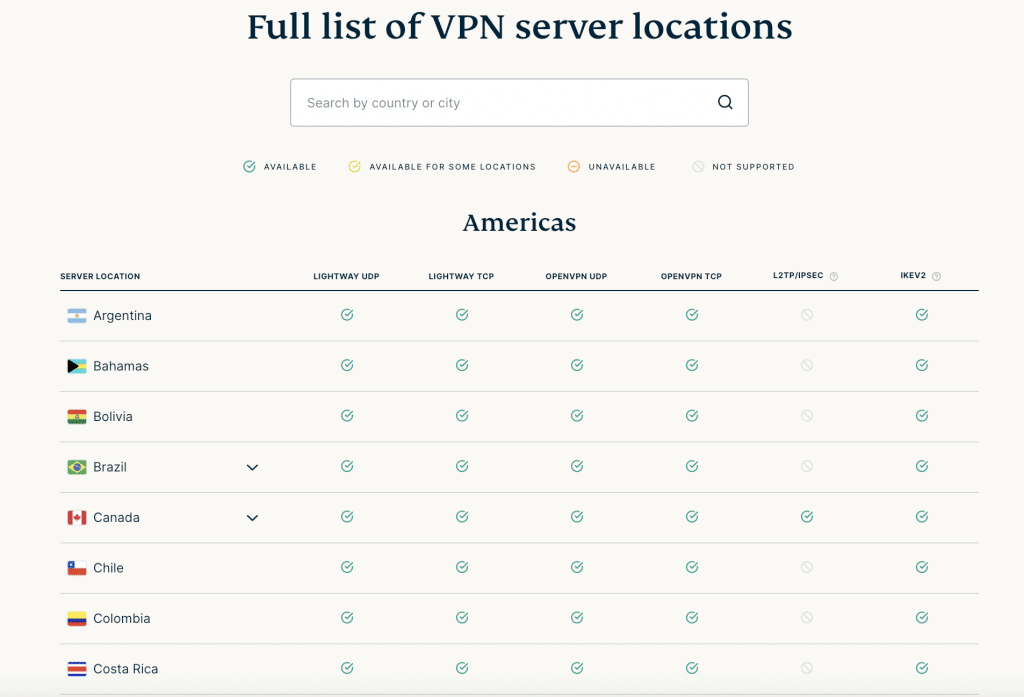
TunnelBear’s server network is respectable but pales in comparison to many of its competitors — not just ExpressVPN. It has locations in only 47 countries — the network I highlight in my Private Internet Access review dwarfs that. Distribution is OK, with three locations in Africa and five in South America, but the closest server to the Middle East is in Cyprus.
TunnelBear doesn’t clarify whether it uses virtual servers. However, it did say that the war in Ukraine has prevented it from maintaining its Ukrainian location. Since it chose not to replace that server with a virtual one, there’s a good chance TunnelBear passes on virtual servers altogether. However, that’s just speculation.
Supported Platforms
ExpressVPN, my top choice as the best VPN for multiple devices, has dedicated apps for more platforms and OSes than TunnelBear. These include a native Linux app and the all-important possibility of router installations. By installing a VPN on a router and configuring it from another device, you can protect any device that goes online through that router.
Router installation lets you stretch a single VPN subscription farther. Given that you can already use ExpressVPN on up to eight devices at once. TunnelBear allows unlimited simultaneous connections, which partly makes up for its lack of router support. Still, router installation makes ExpressVPN more convenient for large families, friend groups or small workplaces.
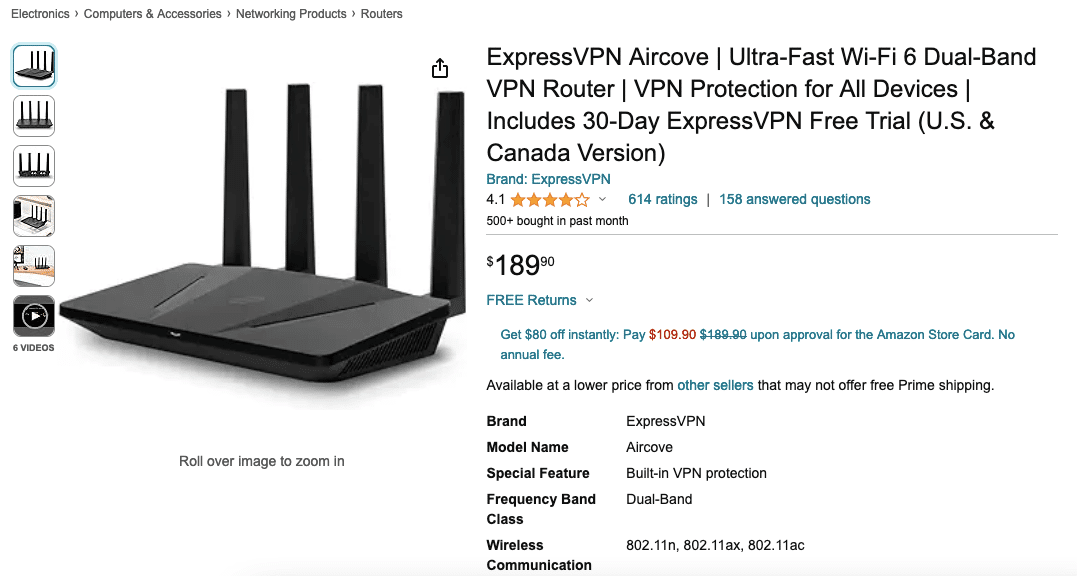
router called Aircove that comes with the VPN pre-installed.
TunnelBear’s incompatibility with routers limits it in another way: You can’t use a router to protect devices for which TunnelBear doesn’t have a VPN client. TunnelBear has limited support for different OSes. You can install it on only a device running Windows, macOS, iOS or Android; as a browser extension for Chrome, Firefox or Edge; or with a manual Linux setup.
ExpressVPN has apps on all the same platforms as TunnelBear and several more besides. You can install it directly on Linux, Kindle Fire, Chromebook and basically every smart TV except Samsung TV (though you can still use MediaStreamer there).
By installing ExpressVPN on a router, you can even protect game consoles — which, combined with its low latency, makes ExpressVPN my pick for the best VPN for gaming.
Parent Company
Though both services have much to offer, especially ExpressVPN, there is one more reason to be cautious: Both ExpressVPN and TunnelBear have concerning parent companies, though for different reasons.
ExpressVPN is owned by Kape Technologies, as covered by my article aptly titled Who Owns Your VPN. Kape is a holding company that owns several VPNs, an antivirus app and two VPN review websites. Once traded on the London Stock Exchange, Kape is now privately owned by investor Teddy Sagi.
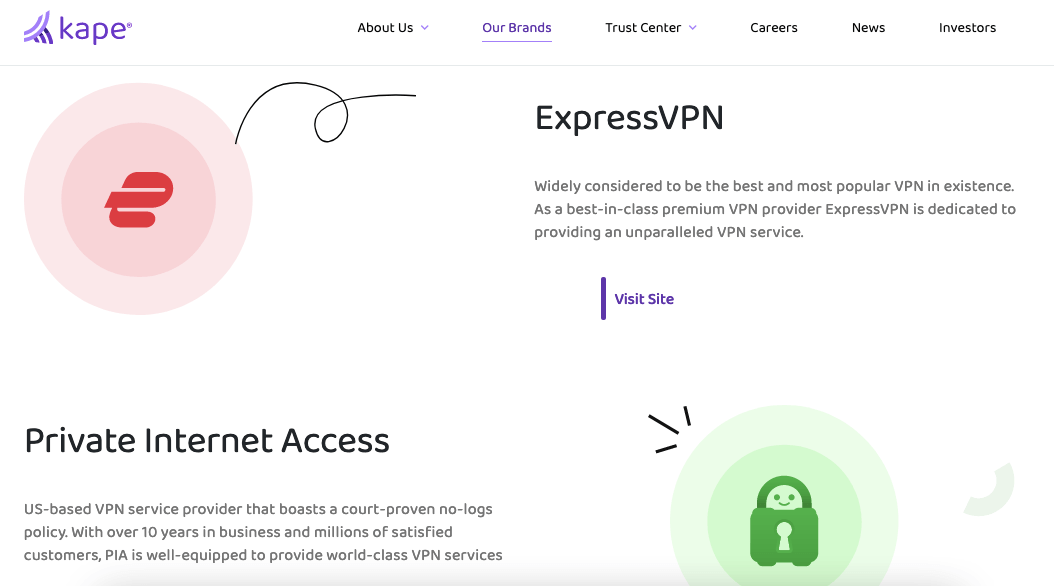
We commonly see people raise two issues with Kape:
- ❌ First, consolidating VPNs weakens the industry by reducing competition.
- ❌ Second, under the name “Crossrider,” Kape once sold an ad-injection script that frequently became a vector for malware.
Kape/Crossrider didn’t encourage malware in any way and it’s since given up that business model, but some users consider it too much baggage for a company managing a VPN.
TunnelBear is owned by McAfee Antivirus. While there are some legitimate grievances with McAfee’s software, none of them apply to TunnelBear, which operates as a totally separate brand. If Kape Technologies puts you off, TunnelBear may be a good ExpressVPN alternative, though I’ve listed some better choices after the conclusion below.
Conclusion: Why I Think ExpressVPN Wins Overall
From the start of this matchup, it was pretty clear that ExpressVPN would take home the win. It almost runs the table, with TunnelBear only pulling ahead in pricing and parent company concerns. TunnelBear isn’t a bad service — it does most things right, in fact — but it fails to impress the way ExpressVPN does.
Both VPNs have decent security, but ExpressVPN has RAM-only servers. Both have obfuscation, but ExpressVPN’s is a lot faster. TunnelBear is cheap and you can even use TunnelBear for free, but without router support like ExpressVPN has, there are far fewer devices it can protect. In areas where TunnelBear falters, such as streaming and overall speed, ExpressVPN soars.
We wholeheartedly recommend TunnelBear’s split tunneling, which gives users more options than ExpressVPN’s comparable feature. TunnelBear is also more budget-friendly for a single user. In any other case, go with ExpressVPN.
How do you feel about these two VPN services? Do you agree with my matchup, or did I miss something important? Start a conversation in the comments below. Thanks for reading!
Other VPN Alternatives to Consider
Some of you may find that neither ExpressVPN nor TunnelBear suit your needs. That’s fine — there are other great VPNs you can try.
NordVPN is often faster than ExpressVPN. It can create a double-hop VPN connection and has servers optimized for P2P file sharing and using Tor Browser. It also includes Meshnet, which can secure any connection between two devices even if it doesn’t go through a NordVPN server. My NordVPN review can tell you more.
Surfshark puts no limits on simultaneous connections, making it ideal for large groups. Its recent Nexus upgrade allows it to regularly switch out your IP address to keep you even more anonymous online. You can learn more in my Surfshark review.
Windscribe has a free plan with 11 servers and a much higher data limit than TunnelBear. Free users can also set three rules on its customizable blocker, R.O.B.E.R.T. See my Windscribe review for more info.
FAQ
Is ExpressVPN Better than TunnelBear?
Yes, ExpressVPN is a better VPN than TunnelBear. It’s got a bigger server network, faster speeds and more ways to stretch a single subscription.Which VPNs Are Better Than TunnelBear?
TunnelBear is in the middle of the VPN pack. If the free version originally caught your attention, try Proton VPN, Windscribe or hide.me, all of which offer less restrictive free options.Is There a Better VPN Than ExpressVPN?
ExpressVPN is my favorite all-around VPN, but competitors do beat it in certain areas. My tests showed that NordVPN is faster on average, and Surfshark comes with unlimited device connections.

Leave a Reply